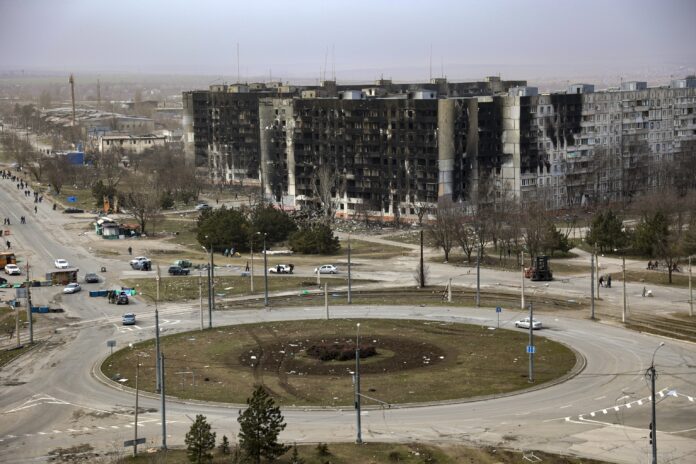Russia completed three months of war in Ukraine on Tuesday without being able to claim the desired victory on the battlefield and not without a clear withdrawal plan, since negotiations with kyiv are frozen.
“We are not pursuing any deadline. All the objectives set by the president, Vladimir Putin, will be met. It cannot be otherwise because the truth, including the historical truth, is on our side,” said Nikolai Patrushev, secretary of the Security Council. Russian.
After a first month of lightning offensive, since then the Russian “special military operation” in Ukraine has been characterized more by Russian withdrawals from northern kyiv and the outskirts of Kharkov than by renowned victories.
After 90 days of fighting, Putin cannot present Russian public opinion with more trophies than control over Mariupol, a symbol of the Ukrainian resistance, and the only provincial capital, Kherson.
As in the First Chechen War, which lasted for more than a year and a half (1994-96), the Russians have been overconfident in their abilities and have made clear miscalculations.
They had neither the combat capacity of the Ukrainian military, trained for eight years by Western instructors, nor the attitude of the civilian population, which did not hesitate to support its president, Volodymyr Zelensky.
The latter has not only managed to create a common front with the West from the beginning, but has also taken the initiative in the propaganda war.
Russian troops have taken control of almost the entire Lugansk region but have failed to break Ukrainian resistance in Donetsk, where kyiv’s most experienced units have been based since the pro-Russian uprising broke out in 2014.
The strategy of the last weeks in the Donbas is reduced to the scorched earth tactic. Russian artillery and aircraft hammer daily without remission the main Ukrainian strongholds, from Severodonetsk and Lysychansk, in Lugansk, to Sloviansk and Kramatorsk in Donetsk.
Russian forces are also fortifying the border of the conquered territories in the southern regions of Kherson and Zaporizhia to prevent a Ukrainian counteroffensive.
The military campaign has managed to irritate both the war party, essentially the security forces, as well as supporters of peace, businessmen and part of the civil service.
The hawks are unhappy with the slow advance of the Russian Army. They believe that the “demilitarization” and “denazification” campaign has slowed down, and insist on taking the capital, kyiv.
Putin opted to slow down the offensive, citing the need to “minimize” casualties. And it is that, according to British Intelligence, the Russian Army would have suffered as many casualties in Ukraine as during the entire War in Afghanistan (1979-89), when the Soviets lost 15,000 soldiers.
Supporters of the war also consider that the time has come to mobilize the reservists, since the general mobilization is rejected by the Kremlin, aware that it is very frowned upon by the Russians.
Supporters of peace not only criticize the Kremlin for its lack of foresight in assessing the economic impact of the conflict and Western sanctions, but also for the absence of a withdrawal plan.
Moscow blames kyiv for giving up on peace talks. But the reality is that things have changed a lot since both sides reached a rapprochement at the end of March in Istanbul.
So Crimea and Donbas were off the agenda. The problem is that since then the Russians have also taken over two other regions: Kherson and Zaporizhia. Conditions on the ground have changed.
They also accuse Putin of failing to foresee the possibility that Western countries might decide to give up oil and gas imports.
In addition, the economic cost accumulates like a snowball. The economic contraction in 2022 will be the largest since Putin came to power (2000), there are problems in the supply chain and inflation is around 18%.
The exit plan is further complicated by the aspirations of Finland and Sweden to join NATO.
The apparently monolithic state propaganda machine is also showing its first cracks.
On the eve of three months of conflict, Russia’s first senior official resigned and publicly condemned what he called “not only a crime against the Ukrainian people, but also the Russian people.”
This is the advisor to the Russian mission to the UN in Geneva, Boris Bondarev, who did not hesitate to attack the Foreign Minister, Sergei Lavrov, for becoming the spokesman for the war party and for threatening the world with the use of weapons nuclear.
“In 20 years of a diplomatic career I have seen different stages of foreign policy, but I have never been as ashamed of my country as I have been since February 24,” he said on social media.
A few days before, the legendary rocker Yuri Shevchuk, leader of the group DDT, denounced during a concert that “old people, women and children die for the sake of certain Napoleonic plans of our Caesar in turn.”
“The country, friends, is not an ass of the president that you have to caress and kiss all the time. The country is the grandmother who lives in misery and sells potatoes at the train station. That is the country,” he added, comments by which will be tried in a court in St. Petersburg.
Conforms to The Trust Project criteria








